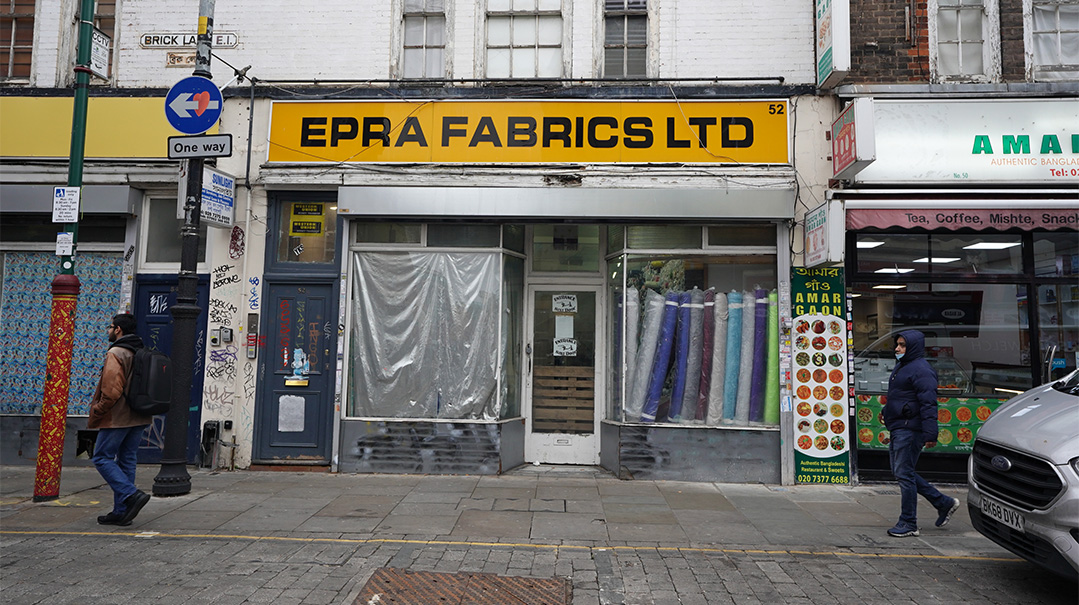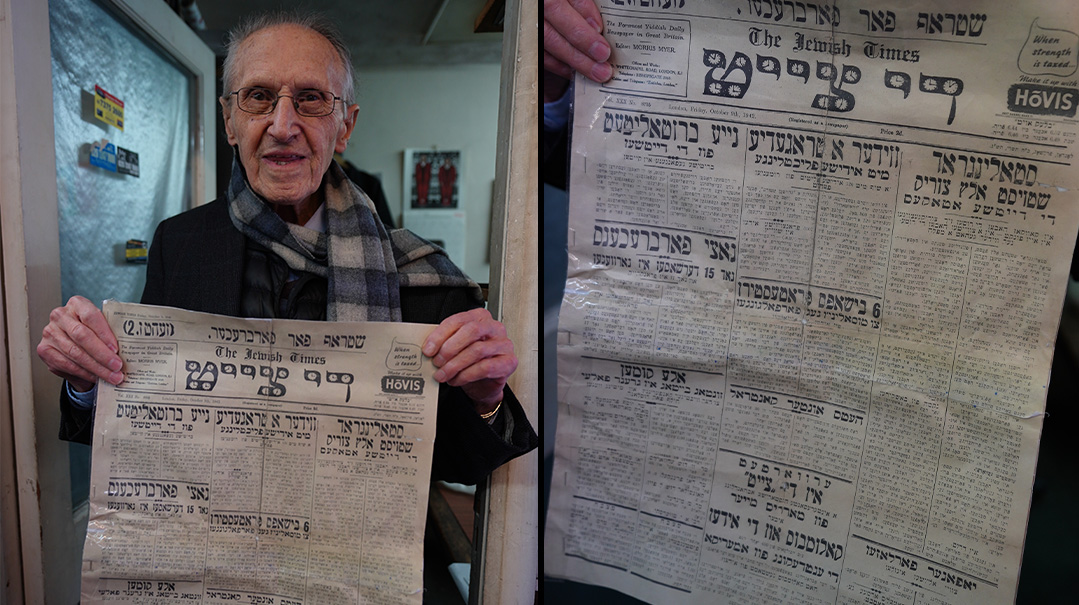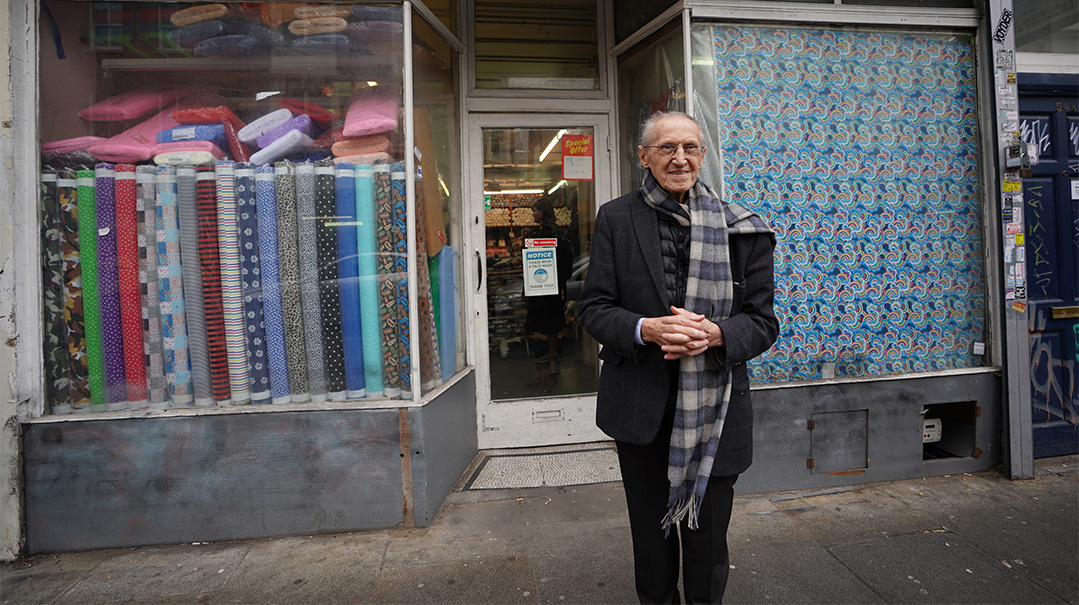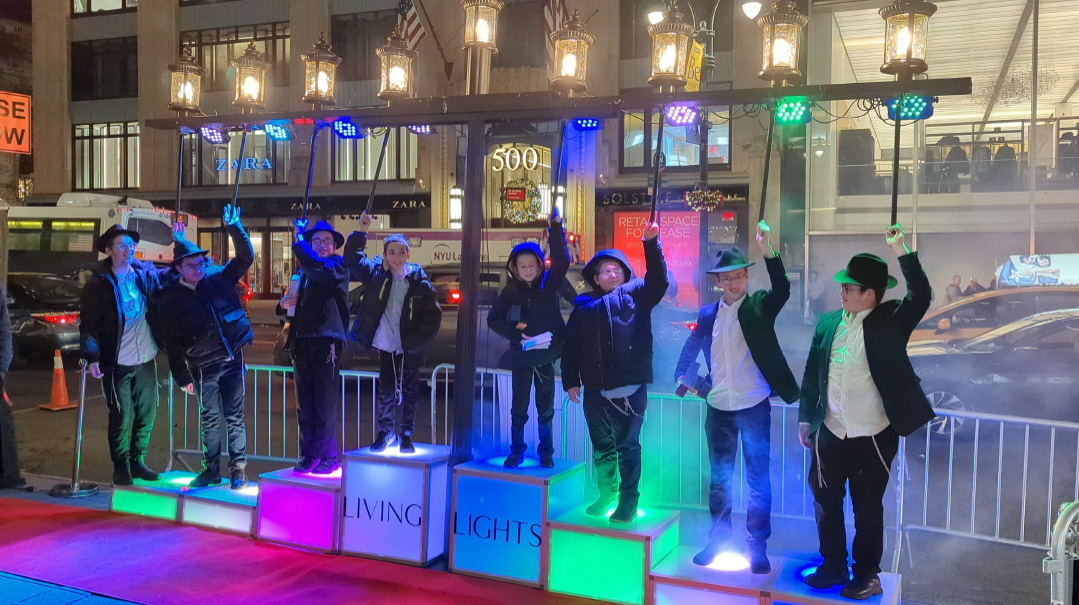Cut from a Different Cloth
| April 26, 2022Leo Epstein's fabric shop is woven into London's East End

Photos: Mendel photography
IT
was at the height of Covid-19, and business was pretty much dead. Until the day the phone finally rang.
“Hi, is that Epra Fabrics?” a woman on the other end inquired.
“Yes,” said Daniel Epstein, son of Leo Epstein, the octogenarian proprietor of the fabric wholesaler in London’s East End who was isolating at home. “How may I help?”
“I’m calling from the Scrub Hub. We’re a group of volunteer women sewing hospital scrubs for nurses across the UK. We’re desperate for fabric. What can you sell us?”
The first few months of Covid, hospitals in England were incinerating scrubs at the end of every day. The risk of infection, they felt, was too great to launder them. Even the clothes nurses arrived to work in — cheap, disposable-grade garments decent enough to travel to work with and suitable to provide care in — were discarded at the end of the day.
Many fabric suppliers were left without stock because of shipping and manufacturing issues, yet Epra Fabrics, a longstanding trader, had connections and was able to procure bulk stock of solid-colored fabrics, flying the stock in from China even when the skies were so restricted.
Even though the frantic demand swiped their shelves clean of over half a million meters of fabric, it didn’t make Leo Epstein rich, or even boost his business much. The orders were paid for by private charities, so the company gave a rock-bottom rate. But it kept the Epsteins busy and the Epra storefront bustling, the echo of the delivery trucks rolling down an otherwise eerily still Brick Lane. And it even drew the appreciation from Her Majesty the Queen, transmitted on her behalf by HM Lord Lieutenant of Greater London.
But 89-year-old Leo Epstein attributes the fact that his textile business was the only one in England that kept the nurses working during Covid to a series of events in earlier, more precarious times, when moral and religious decisions would determine the Jewish future of so many struggling families.

The shop at 54 Brick Lane, whose clients have included Prince Charles, has endured through a neighborhood change, economic fluctuations, and a pandemic. And 89-year-old Leo Epstein isn’t planning on retiring anytime soon
No Time to Wait
Leo’s father, Hillel Epstein, was born in Poland in 1900. When he turned 18, he smuggled himself into Germany to avoid being drafted into the Polish army. “You had more chance of being shot in the back by the Poles than up front by the Germans,” he would tell Leo years later.
Hillel married Sarah and they settled in Berlin, where they had two children, a son and a daughter, and ran a housewares store. As Radomsker chassidim, their son Leo merited to have the Radomsker Rebbe as his sandek, even though the Rebbe lived in Poland. The Rebbe had severe diabetes and there were no doctors in his hometown, Sosnowiec, so he came to Berlin for treatment regularly, and he happened to be there when Leo was born.
Life was relatively peaceful until anti-Jew laws started creeping through the city and exploded on the night of Kristallnacht, when Leo was six years old. His father wanted to clear up the destruction in his store, and since at that point, women and children were not official targets of violence, he took little Leo as security. The impressionable young child didn’t see too much as he climbed over mounds of splintered glass and debris — his father tried to shield him by taking him through side streets. But he saw enough.
“My wife asks me how I can possibly remember, I was so young,” an eloquent Leo tells me in the timeworn front office of Epra Fabrics. “I tell her, you don’t forget something like that.”
The next day, Hillel Epstein was rounded up with others to be sent to the Sachsenhausen concentration camp, a labor and death camp that in 1938 primarily housed political prisoners who were used as tests to figure out the most efficient way of mass murder. Still, at that point, Germany had not yet instituted its program of genocide, and Jews could still emigrate if they could procure a visa — the Germans were happy to have the Jews leave. Sarah Epstein worked around the clock to procure visas to England for the family, and five weeks later, she had them.
The SS gave Hillel 24 hours to leave the country. He contacted his wife and told her that the family should meet him at the underground station.
“We waited at the station,” recounts Leo 83 years later. “Suddenly, a stranger came toward us and we thought we were being accosted. He had to convince us he was our father. After only five weeks in the camp, he was unrecognizable.”
Hillel’s plan was to go ahead to England, while Sarah would stay to sell off their assets and then follow with the children. A staunch Radomsker chassid, Hillel didn’t make a move without consulting his Rebbe. “Men furt nisht oon der bnei bayis (You don’t go without the family),” the Rebbe instructed.
And so, the family of four headed straight for the airport with the clothing on their backs and a paltry ten shilling in their pocket — the maximum allowed — leaving their entire livelihood and savings behind. “Airfare was expensive, but my father didn’t care what the tickets would cost. He wanted to use up whatever he could before it got into the German’s hands.”
And so, they flew to England, the only country who opened their borders to Jews at the time.

During the war, parnassah for the Epsteins improved, when Hillel was deployed to a factory in the East End producing leather flying jackets – an ironic precursor to the East End textile industry
Beating the Blitz
In England, the family moved in with a distant cousin in Stamford Hill, but the cousin was penniless too, and the Epsteins felt bad about burdening them.
How to move forward? After 20 years in modern Berlin, Hillel Epstein no longer looked like a chassid, but he was a chassid at heart, and wanted advice from a rebbe.
“My father always taught us to go to a chassidishe rebbe for advice,” shares Leo. “He said that because chassidim go to their rebbe for every move, the rebbes have already deliberated every dilemma.”
Hillel asked his cousin for a connection to a local rebbe. To his delight, the famed Shotzer Rebbe was just around the corner. Hillel went to the Rebbe and explained that he was a German refugee with not a penny to feed his family. He needed a job but he couldn’t speak English, so it had to be an unskilled one. The Rebbe immediately picked up the phone to one of his chassidim, Reb Getzel Berger, the future real-estate businessman and philanthropist. At the time he owned a successful battery factory.
“I need a favor from you,” the Rebbe told Reb Getzel. “I have someone here who needs work.” Reb Getzel instantly agreed to take him onto the production line. Then the Rebbe went further. “I need another favor. He’s coming today. At the end of the day, pay him for his work. He needs to feed his family.”
Reb Getzel also wrote Hillel a letter affirming his full-time employment, enabling him to rent accommodation for his family.
“My father always felt that perhaps in the merit of that kindness, Reb Getzel then went on to his great wealth,” says Leo.
Nine months later, war reached England. Leo and his sister were evacuated to Shefford, along with hundreds of Jewish children.
“The askanim scanned the size of houses and knocked on doors saying, ‘You’re having two kids, you’re having four,’” Leo relates. “We were lucky with our hosts. They were so nice. Unlike my wife, who’d been evacuated to a mining town in Wales. Her hosts stole the packages her parents sent her, because they were so poor themselves.”
For little Leo, the trip to Shefford was quite the adventure, but it didn’t last long. He came down with measles and the villagers sent him home, lest it spread.
Back in London, he lived through the Blitz.
At first, Londoners would hunker down in government-built bunkers in their backyards. When that wasn’t sufficient protection against the ferocity of German air raids, the government directed all residents to underground stations. Every night, thousands would head to the Tube station, which was lined with bunkbeds. They could only arrive at midnight and had to leave by 6 a.m., when the trains would start. It was so cramped that people slept on escalators and even hung hammocks across the rails.
The massive death and destruction all around notwithstanding, seven-year-old Leo — confident in the safety and protection of his parents — found it all a bit thrilling. The rushing to the station at night, looking up at the sky ablaze with explosions while clutching his parents’ big protective palms. Fortunately, they all stayed safe.
Ironically, during the war, parnassah improved as well. With many men joining the war front, the country was short of workers. As per the Essential Work Order that became law in 1941, those who stayed had to engage in war work. Hillel was deployed to a factory in the East End producing leather flying jackets for the RAF fighters. And due to demand, his wages doubled overnight.
You could say that was the Epsteins’ first foray in the East End textile industry.
The Gamble
Leo, who was among the first six students in the Yesodey HaTorah school, had reached 18, and told his father he was ready for marriage.
“How can you get married without earning a living?” his father asked him, a bit taken aback.
Leo soon found a job in the East End, trading textiles in the “shmatteh business,” where many Jews found a livelihood.
“You couldn’t get a white-collar job in those days,” Leo says. “You’d say your name and you wouldn’t be allowed through the door for an interview. That’s why some people changed their surnames, lied about their education and background, and changed their appearance. But it didn’t always help.”
Once Leo was earning £10 a week, he was introduced to Chaya Sarah Monat, and they got engaged. Mr. Steiner, a fellow shmatteh trader on Brick Lane, advised him to rent the vacant space next door, fill it with some fabrics and become his own boss. Leo was terrified. The rent was £6.50 a week. How would he get by as a newlywed? But he took the plunge — and his business took off.
He soon had to move to bigger premises down the road, 54 Brick Lane, where Epra Fabrics is located today, together with the storefront next door.
A Shtetl in London
At the time, the East End was a bustling Yiddish-speaking neighborhood, with barrels of briny schmaltz herring and baskets of bagels being hawked on every corner, together with the Yiddish daily Der Tzeit. Even shop signs were hand-painted in Yiddish.
When it came to Minchah, there was a minyan factory right across from Leo’s store at the main shul, Machzikei Hadas, so men could run to daven at their own convenience. Another shul shared their thin walls with Epra Fabrics and Leo could practically join the davening from the other side.
Typically, store owners lived upstairs from their shops. Leo was the exception, living in Stamford Hill, but he loved the East End atmosphere with big shuls and small shtiblach on every block. His father-in-law, Rabbi Yaakov Yisroel Monat, was the rav of one of those shtiblach.
Many of the shuls had talented chazzanim leading the services, but no one was in a hurry to leave.
“People didn’t mind the long davening,” says Leo. “Shul was warm, comfortable, and you basked in the baal tefillah’s beautiful voice. At home, it was usually cramped and cold.”
There was no kiddush, though, because, as Leo explains, “no one could afford to sponsor it. Parnassah was very tough in those days. Every shul had a gemilus chesed fund to which members had to contribute a sixpence each week, besides their membership. That went toward fellow members’ weddings, sick pay for the infirm, and the like.”
Because of the tough economic situation, Jewish bosses could be very hard on fellow Jewish workers, not because they were nasty, but because they were under enormous pressure. There was competition, they’d have to lower their prices, and there was overhead to cover. “Woe to anyone caught slacking outside,” says Leo. “If your boss caught you, you’d be fired.”
As for shidduchim, shop owners preferred to take each other for mechutanim. It was considered beneath them to take the child of a worker. Even the owner of a tiny business would do.
Because the textile business works by seasons — before the new season, a customer would buy one outfit, and before the next, another outfit — it was hectic during those periods, with workers putting in overtime until 9 p.m., for little pay, in bad conditions and with no coffee breaks. But then it would get quiet, until the new season rolled around.
Most women stayed home in order to keep their busy households running, but the Epsteins waited six years before they had their three children. And so, with time on her hands, Chaya Sarah took a job as secretary in the local Jewish school.
“It was so out of ordinary,” says Leo, “that my mother was embarrassed. ‘Why are you working?’ she chided my wife. ‘People will think your husband can’t support you!’ ”

End of the East End
The East End is located near the London Docks, a key center for imports and exports. But slowly, the Yidden moved away, hoping to find better opportunities. Leo, who never moved his shop, laments the shift. Even though the Jews moved on to more and better opportunities, he relished the shtetl-style living and the insular separateness.
“Not only did non-Jews not mix with the Jews, they looked down at us,” he says, but that wasn’t bad. “Their world was closed to us. And that protected us.”
Today, the big Machzikei Hadas shul is a mosque. When I take my leave of Leo, I’m one Jew walking against a sea of white-cloaked and white-capped Muslims returning from their noon services. The only reason I’m not quaking is because Leo told me how well he gets on with the Muslims in the area, who now make up most of his clientele.
Leo has been nicknamed “the last Jew on Brick Lane,” a title he is infinitely proud of. “The Jews left because they felt uncomfortable with their new neighbors. But when the original Muslims came over from Pakistan and Bangladesh, I felt an affinity with them. I was also a refugee and I understood where they were coming from.”
As the Asians started replacing his Jewish customers, they noticed his British-made merchandise. “Why are you buying your stock here?” they asked. “You can get it much cheaper in the Far East.”
In fact, it was these new immigrant clients who connected him with his initial Chinese contacts, and thanks to them, most of what he sells now is “Made in China.” He never actually traveled to China himself, though, and today there’s no need. The factories all have local agencies.
New Neighbors
While technology has made the world smaller, it has made its people further apart. Epra Fabrics’s floor is threadbare due to the years of foot traffic, the door constantly swinging open with cheery clients. Leo was a listening ear to them all, and they’d share their family milestones with him, and, since they saw him as a father figure, would ask his advice for personal problems. One nonreligious couple took the frum-looking proprietor for a rabbi and asked him how to handle their son who wanted to marry a non-Jewish girl.
One of the more prominent clients Epra Fabrics enjoyed over the years was Prince Charles, who hosted an annual holiday party for his staff in Buckingham Palace until a few years ago. The color scheme was black and white, and the posh event planners would come every year to the humble store on Brick Lane for black and white felt that was thick enough to use as screens behind the buffet tables, to conceal the messy preps going on in the room behind.
Today, though, all that has changed. Most transactions are done by email and the cherished handshakes and relationships are a thing of the past, which the personable old-time Leo misses greatly.
Still, the current neighbors enjoy his friendship. One Erev Yom Tov, the neighbors on either side heard him pulling down his shutters at noon. Both of them came out, asking if everything was all right. Leo was a workaholic, they knew. He explained that he had a Jewish holiday that night and would be away for two days.
“We’ll miss you!” they told him. But when Leo closes at noon on Fridays, “I’m one of the crowd,” he says. “The Muslims also go to pray then.”
He’s not looking to blend in, though. He, his son and grandson, who work in the family business, all proudly wear black yarmulkes in this sea of white ones.
Not Going Anywhere
At 89, Leo shows no signs of slowing down. “I went crazy during lockdown,” he says. “My wife kept busy running the house, cooking, chatting to the children and grandchildren. I sat around for six months and I just wasn’t used to it.”
Beyond the front office, his son Daniel deals with customers and processes orders. Most of the business has gone online since Covid.
But some things won’t change. One of those is the old computer program they still use, which is archaic by today’s standards but accommodates the elderly proprietor. “Dad knows this program fluently,” says Daniel. “We’re sticking with it, so he can stay involved.”
And the other is the weather-beaten sign announcing Epra Fabrics is here. Yes, still here, after 64 years and counting.
(Originally featured in Mishpacha, Issue 908)
Oops! We could not locate your form.







